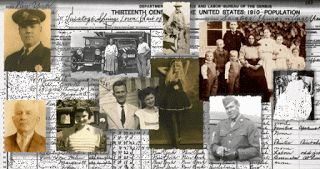
Much has been said about the majority of historicaland genealogical records being unavailable online.
FamilySearch estimates that at least 90% of records are not available in a digital format. So how does a genealogist findand take advantage of the vast collections of paper records? One way is throughthe use of Genealogists.com to find the hardcopy records in the world's numerous archives and repositories. Another way is through online finding aids. This article discusses the latter.
Finding aids have been around for as long as therehave been archives. A finding aid is a document that allows a researcher tofind detailed information about a collection of records. Finding aids can takemany forms. They can be as simple as a single page spreadsheet or ascomprehensive as a website.

The old style library card catalog was a findingaid. Nowadays, most libraries have their catalogs published online. While librarycatalogs focus on locating a specific book, finding aids direct researchers tospecific collections within the larger archive. For example, the MassachusettsHistorical Society houses several collections including the Adams FamilyPapers. Their website contains an online findingaid (or collection guide) that describes the complete Adams Family Papers.The collection includes diaries, letters of John, Abigail and several of theirchildren as well as other miscellany like poetry and account books.
In larger archives and historical societies, afinding aid contains some or all of the following parts:
- Overview of the collection
- Biographical or historical information about thecollection
- Scope and Contents of the collection
- Terms of use/access to thecollection
- Relevant information on the materials in thecollection
- Search terms or subject headings related to thecollection
- Content List (How the collection is stored and what it contains)
While many of the typical online records (used forgenealogy) can provide a basic framework (such as census records, vitalrecords, etc.) for our ancestors’ lives, archival collections may unlock ourancestors’ individual stories.

The Library of Congress has hundreds of uniquecollections listed on their website. Each collection has an online finding aid.One collection is the “LouiseBates Ames papers, 1815-1996.” According to this finding aid, Louise was achild psychologist and educator. Her papers include diaries, photographs, andnewspaper clippings. There are 52 boxes of materials. The collection has alsobeen indexed; two of the indexed people are Dr. Benjamin Spock and MargaretMeed!
While most of us do not have famous relatives, we might have an ancestorwho knew someone famous, or perhaps served in a military unit led by someonenoteworthy. The possibilities are endless! The Library of Congress is just oneof hundreds of archives in the United States that publishes online finding aidsto their collections.

The National Archives is another example of an archivewith great online finding aids. Always check the archives in the regions nearwhere your ancestors lived, keeping in mind that sometimes, manuscripts end upwhere you least expect them.
When you examine an archive's online finding aids and locate an intriguing box or diary in a special collection, notify Genealogists.com and their researchers will obtain the record for you. Remember that Genealogists.com has researchers who work in the numerous archives and repositories located around thecountry and can access and send you the desired records.
by Deborah Sweeney © 2015, Genealogists.com, All rights reserved




.jpg)